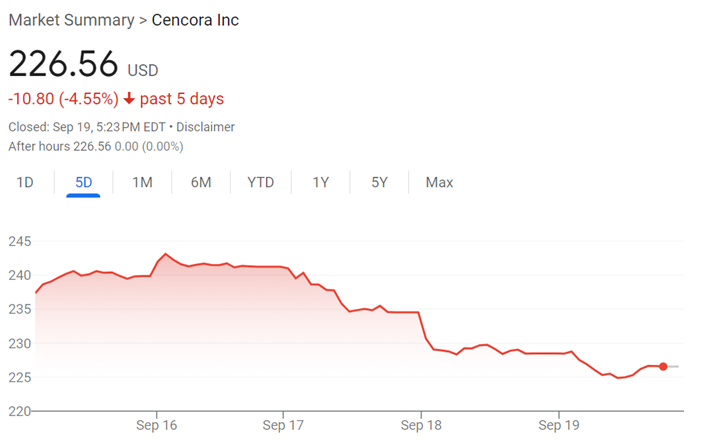Friend
Professional
- Messages
- 2,677
- Reaction score
- 1,095
- Points
- 113
The company has raised the bar for all ransomware, setting a new record.
In March 2024, the American company Cencora, one of the largest distributors of medicines, paid hackers $75 million, which was the largest ransom in history.
According to sources familiar with the situation, the amount was transferred in 3 stages in Bitcoin (BTC), although the attackers initially demanded $150 million. As a result of a hacker attack that the company discovered in February, confidential data was stolen.
Cencora has not officially commented on the incident, limiting itself to a statement that it adheres to publicly available information. The company's July quarterly report reflected the costs associated with the incident, which was classified as a cyberattack. However, the exact amount of losses associated with the attack remains unclear.
After the publication of the news of the payment, the company's shares fell by 3.1%, reaching a low level of $227.20 per share. Cencora, formerly known as AmerisourceBergen, is one of the largest U.S. companies in its segment with a capitalization of about $46 billion and revenue of $262 billion for the last fiscal year.

Performance of Censora shares after the news of the buyback
Reports of the $75 million ransom first surfaced in July, when Zscaler specialists reported that the Dark Angels group had received a large payment without naming the victim. Only after an investigation by Bloomberg did it become known that Cencora was the victim of the attack.
According to experts, a payment of this magnitude was previously unthinkable. For comparison, the largest recorded buyback before was $40 million paid by insurance company CNA Financial Corp. in 2021. Experts note that such significant amounts make the healthcare sector an even more attractive target for hackers.
Cencora said the incident will not have a material impact on the financial position or operations. However, the company admitted that the cyberattack stole data, including patients' names, addresses, dates of birth, and medical information, requiring notification to victims and regulators.
Experts warn that paying the ransom does not guarantee the destruction of stolen information. Hackers can continue to use the data for further attacks or blackmail.
Source
In March 2024, the American company Cencora, one of the largest distributors of medicines, paid hackers $75 million, which was the largest ransom in history.
According to sources familiar with the situation, the amount was transferred in 3 stages in Bitcoin (BTC), although the attackers initially demanded $150 million. As a result of a hacker attack that the company discovered in February, confidential data was stolen.
Cencora has not officially commented on the incident, limiting itself to a statement that it adheres to publicly available information. The company's July quarterly report reflected the costs associated with the incident, which was classified as a cyberattack. However, the exact amount of losses associated with the attack remains unclear.
After the publication of the news of the payment, the company's shares fell by 3.1%, reaching a low level of $227.20 per share. Cencora, formerly known as AmerisourceBergen, is one of the largest U.S. companies in its segment with a capitalization of about $46 billion and revenue of $262 billion for the last fiscal year.

Performance of Censora shares after the news of the buyback
Reports of the $75 million ransom first surfaced in July, when Zscaler specialists reported that the Dark Angels group had received a large payment without naming the victim. Only after an investigation by Bloomberg did it become known that Cencora was the victim of the attack.
According to experts, a payment of this magnitude was previously unthinkable. For comparison, the largest recorded buyback before was $40 million paid by insurance company CNA Financial Corp. in 2021. Experts note that such significant amounts make the healthcare sector an even more attractive target for hackers.
Cencora said the incident will not have a material impact on the financial position or operations. However, the company admitted that the cyberattack stole data, including patients' names, addresses, dates of birth, and medical information, requiring notification to victims and regulators.
Experts warn that paying the ransom does not guarantee the destruction of stolen information. Hackers can continue to use the data for further attacks or blackmail.
Source

